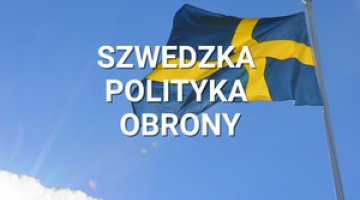Any changes? The future agenda of Sweden’s security policy
Sweden’s annual security and defence conference, which this year focused on the future of the country’s security policy, was held in Sälen on 12-14 January. It was attended by almost all the leaders of Sweden’s ruling and opposition parties. The discussions have revealed whether and how the mindset of the Swedish elite has changed following the heated debates on defence issues in 2013. The opposition parties (Social Democrats, the Green Party, and the Left Party), which are likely to form a coalition government after the election to the Swedish parliament in September 2014, were given the opportunity to present their own priorities. The discussions have brought to the surface conflicting perceptions within the political elite concerning the threats and challenges to Swedish security, and divergent positions on the future direction of the country’s security and defence policy.
It is highly likely that, due to a coalition compromise, the current course of Sweden’s security policy (namely, a policy of non-alignment along with close co-operation with NATO) will be maintained following the parliamentary election, albeit with new “leftist" influences (a greater involvement in the United Nations). Big changes that could lead to a significant strengthening of Sweden’s defence capabilities, or a decision on NATO membership, are not likely. Paradoxically, polls suggest that in the long run a more radical change in Stockholm’s security policy may be shaped by a gradual, bottom-up evolution of public opinion on the issue.
Context: A turbulent 2013
In 2013, Swedish politicians, military experts, and even public opinion, took part in the most heated debate on security and defence since the end of the Cold War. The discussions were precipitated by a series of events that, in the eyes of many experts, have seriously undermined the government’s current security and defence policy and the related reform of the Swedish Armed Forces. This policy has been based on the perceived absence of conventional threats to the military security of the European countries - characteristic of early 21st century thinking. This threat perception led many European governments to focus on tackling the challenges posed by globalisation (namely, those resulting from social, political and economic processes as well as from climate change, rather than addressing the actions of state actors). Also Sweden began to actively participate in an international crisis management policy - all the while maintaining its non-aligned status (that is, remaining outside military alliances and freely adapting its policies during wartime). As a result, Sweden reduced its defence budget and the number of the military; it also abolished conscription, and adapted the armed forces for participation in foreign missions - although this has limited Sweden’s defence capabilities at home. Following the Russian-Georgian war, which had triggered security concerns across the Nordic and the Baltic Sea regions, Swedish security policy was augmented in 2009 by the adoption of a unilateral political declaration of "solidarity" (Sweden vowed not to behave passively in the event of a disaster or armed attack on any EU or Nordic country, and would expect these countries to reciprocate). In addition, Sweden increased its military cooperation with the Nordic countries and NATO, but also pressed ahead with the plan to gradually transform its armed forces into an expeditionary force.
In early 2013, the Supreme Commander of the Swedish Armed Forces stated that in the event of a limited armed attack Sweden would be able to defend itself for no more than one week. This led to a series of heated public debates. In the context of increased uncertainty in the Nordic and the Baltic Sea regions, which stemmed primarily from the reform and modernisation of the Russian Armed Forces and their military exercises in the region, the statement sent a political shock wave across Sweden. In April 2013, it was disclosed that the Russian Air Force had carried out an exercise near the Swedish border, which simulated an attack on two military targets in Sweden. Crucially, it was revealed that the Swedish fighter aircraft tasked with protecting the country’s airspace on duty at the time failed to respond. In December 2013, the Swedish National Audit Office (Riksrevisionen) published a scathing report on the MoD’s reform of the Armed Forces. The report highlighted inadequate staffing levels, and a shortage of armament and military equipment. It also warned that the Swedish Armed Forces were unable to both ensure credible defence capabilities at home while engaging in crisis management abroad. The conclusion reached was that the military is unable to achieve the objectives of the reform introduced in 2009.
Differences in the assessment of security threats and challenges
The conference in Sälen has shown that the discussions started in 2013 have only partially influenced the views of the Swedish political parties and that there remains substantial divergence in their assessment of the threats and challenges to Swedish security.
The differences are particularly evident among the parties forming the current coalition - the Moderates, the Liberals, the Christian Democrats and the Centre Party. The Moderates - who before coming to power were seen as the party most interested in security issues and NATO accession - are now more concerned with the consolidation of the state budget than with defence matters. For Frederik Reinfeldt - Sweden’s Prime Minister and leader of the Moderate Party - the threats and challenges to Sweden’s security are linked primarily to globalisation (including terrorism, transnational organised crime, cyber attacks). Although he agrees that Russia’s authoritarian tendencies and its desire to control the neighbouring region are indeed worrying, he argues that cooperation within the EU and NATO makes military threats to the security of any of the member states highly unlikely. Consequently, the Moderates believe that the current security policy is adequate and should be continued. Their two smaller coalition partners, the Christian Democrats and the Liberals, however, hold a different view. They consider the current political situation in Russia, coupled with Moscow’s imperialist policy in the region, to be the most important reference point for Sweden’s security policy and for the reform of the armed forces. The two parties have therefore called for measures which would strengthen the military (and the civilian) capabilities to defend the country and to resist external pressure, to "reform" the current reform of the Swedish Armed Forces, and to increase the defence budget. They have also identified the specific regions of the country (Stockholm, Gotland, Blekinge/Skåne, Sweden’s western coast), which, due to their significance for the functioning of the Swedish state and for control of military operations in the Baltic Sea region, may be particularly vulnerable in the event of a crisis or a conflict in this part of Europe.
The left-wing opposition appears more unified in their assessment of the threats and challenges, although their position is at times somewhat inconsistent. Stefan Löfven, the leader of the Social Democrats (who is expected to become Sweden’s next prime minister), focuses primarily on security in the economic and social sphere, rather than on Sweden’s defence capabilities. Although he recognises that the recent developments in Russia are alarming and that the rising frequency of Russian military exercises in the region does indeed alter the security situation, Löfven does not consider Russia to be a direct military threat to Sweden. He does, however, prioritise developing national defence capabilities over participation in foreign operations. The Green Party has oriented itself according to a broad definition of threats and challenges and its main objective is to promote peace globally – they see the Baltic Sea region as one of the most stable parts of the world. A similar position has been adopted by the Left Party, which believes that in the foreseeable future, Sweden will not face a traditional military threat. However, this consensus on the threats and challenges perception has not translated into shared priorities in the area of national security and defence policy.
Differing priorities in security and defence policy
The differences in the perception of threats and challenges to Sweden’s security are reflected in the nature of the proposed changes to Sweden’s security policy, the way of developing civilian and military capabilities, and in the work on the defence budget.
Within the ruling coalition, the Moderates favour continuing the current policy of non-aligned “solidarity” linked to close political and military cooperation between Sweden and NATO, and with the Nordic countries. They are also in favour of the reform of the Armed Forces currently underway, albeit with minor adjustments and with a slight increase in defence spending. According to Prime Minister Reinfeldt, Sweden’s accession to NATO is not currently an option because of low support for this idea in parliament. Nonetheless, Stockholm’s close ties with NATO are important for maintaining stability and security in Europe and around the globe. On the other hand, the Swedish Liberals are in favour of joining NATO in 2020 and of modernising the armed forces to strengthen the country’s defence capabilities (including, its medium-range air defence). They also advocate a partial reintroduction of conscription and a significant increase in military spending. This view is shared by the Christian Democrats; their position on NATO membership is, however, less radical – they favour a careful analysis of the possible changes to Sweden’s security policy (including accession to NATO) and of their potential consequences for Sweden.
The opposition Social Democratic Party takes a position similar to that adopted by the ruling Moderates, albeit with minor adjustments. Their priorities include Sweden retaining its non-aligned status (they do not mention solidarity with the other countries in the region, though), maintaining cooperation with NATO and the EU, close cooperation in the Nordic region, and a greater involvement in the work of the United Nations. Any adjustments to the current reform of the Armed Forces would be minor and probably limited to improving the recruitment and performance of civilian and military personnel. In a similar way to how the Moderates clash with their coalition partners, the Liberal Democrats and the Christian Democrats, it is common to see the Social Democrats in conflict with their own future coalition partners. However, both the Greens and the Left Party reject close cooperation with NATO (including, participation in NATO-led operations and in the NATO Response Force (NRF), and object to NATO exercises taking place in Sweden). They also oppose plans for NATO accession, albeit for substantially different reasons – the Greens object to cooperating with a military alliance that pursues a policy of nuclear deterrence, while the Left Party believes that Sweden will be able to shape its own security and defence policy and pursue its own priorities more effectively outside NATO (and partly also outside the EU-led initiatives). The Greens are interested primarily in pursuing a policy of conflict prevention, and propose redirecting funds from the defence budget to civilian development and crisis management organisations (which de facto would spell a substantial reduction in military spending). The Left Party, on the other hand, believes that the credibility of Sweden’s non-alignment policy is contingent on its strong ability to independently defend the country and on involvement in foreign operations - as a consequence they are calling for a significant increase in the defence budget.
Sweden’s security policy after the 2014 election
Despite the recent debates in Sweden, the similar positions of the two major parties - and polarised views of their smaller coalition partners - suggest that the country’s current security policy will continue in the next four years. The new government formed after the election to the Swedish parliament in September 2014 will most likely include the Social Democrats, the Greens, and the Left Party. Such a coalition will place emphasis on Sweden’s non-aligned status and continue Stockholm’s cooperation with NATO (through the NRF, military exercises and, to a lesser extent, through joint operations) as well as develop cooperation with other Nordic countries. It is likely that Sweden will work most closely with Finland since the current Conservative government in Norway is more focused on developing closer ties with NATO, and has recently withdrawn from several key armaments cooperation projects developed with Sweden. Within the EU, Sweden will advocate developing greater conflict prevention capabilities and emphasise the need for civilian CSDP operations. Sweden is also likely to become more active within the framework of the United Nations; both at the political level (its objective being non-permanent membership in the UN Security Council in 2017-2018) and at the military level (increased participation in peacekeeping operations). The new government will also seek to reconcile Sweden’s military participation in crisis management operations with efforts to increase Sweden’s defence capabilities; this may prove difficult without a significant increase in defence spending.
Future military exercises by Russia are unlikely to be sufficient to radically change the stances of the Swedish parties on the direction of the country’s security and defence policy and to significantly re-orient their focus to the Baltic Sea region. Instead of a top-down change - reliant on a shift in the positions held by political parties - the reorientation is more likely to stem from a bottom-up change in public opinion. Polls suggest that the security debates in 2013 have had a big impact on Swedish society. According to an opinion poll conducted by the Swedish government agency MSB, the number of people in favour of Sweden joining NATO rose to 36% in 2013 (from 30% in 2012), with 40% of respondents opposing NATO membership (down from 47% in 2012). At the same time, confidence in the government’s defence policy dropped to 26% in 2013 (from 35% in 2012), while 52% of respondents had no confidence in defence policy pursued by the ruling coalition.
Appendix
Support for Sweden’s political parties in December 2013
The parties of the ruling coalition
Moderates (m) - 25.5%
Centre Party (c) - 4.7%
Liberal People's Party (fp) - 5.4%
Christian Democrats (kd) - 4.1%
The opposition parties
Social Democrats (s) - 34.3%
Green Party (mp) - 8.8%
Left Party (v) - 6.7%
Swedish Democrats (sd) - 9.3%
Other parties - 1.3%
Source: Radio Sweden, Red-green parties strong lead in polls, 4 December 2013, http://sverigesradio.se/sida/gruppsida.aspx?programid=2054&grupp=20048&artikel=5723312




